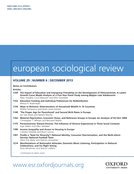-
Views
-
Cite
Cite
Marc Hooghe, Cecil Meeusen, Ellen Quintelier, The Impact of Education and Intergroup Friendship on the Development of Ethnocentrism. A Latent Growth Curve Model Analysis of a Five-Year Panel Study among Belgian Late Adolescents, European Sociological Review, Volume 29, Issue 6, December 2013, Pages 1109–1121, https://doi.org/10.1093/esr/jcs086
Close - Share Icon Share
Abstract
In this article, we investigate individual-level changes in ethnocentrism during adolescence and pre-adulthood. We use structural equation modelling for longitudinal designs on data from the Belgian Political Panel Survey (BPPS, 2006–2011). In this panel, 2,428 Belgian adolescents were questioned at three points in time: at the ages of 16, 18 and 21 years. Individual change is analysed by using Latent Growth Curve Modelling. Individual variability was explained using two important predictors of ethnocentrism: education and intergroup friendship. Adolescents in lower educational tracks have higher initial levels of ethnocentrism, and their levels of ethnocentrism continue to rise during the observation period. Adolescents who change to lower education tracks between 2006 and 2008 increase more in ethnocentrism than adolescents who stay in the same track. While intergroup friendship had an effect on initial levels of ethnocentrism, this contact did not have an effect on subsequent changes in the level of ethnocentrism.



